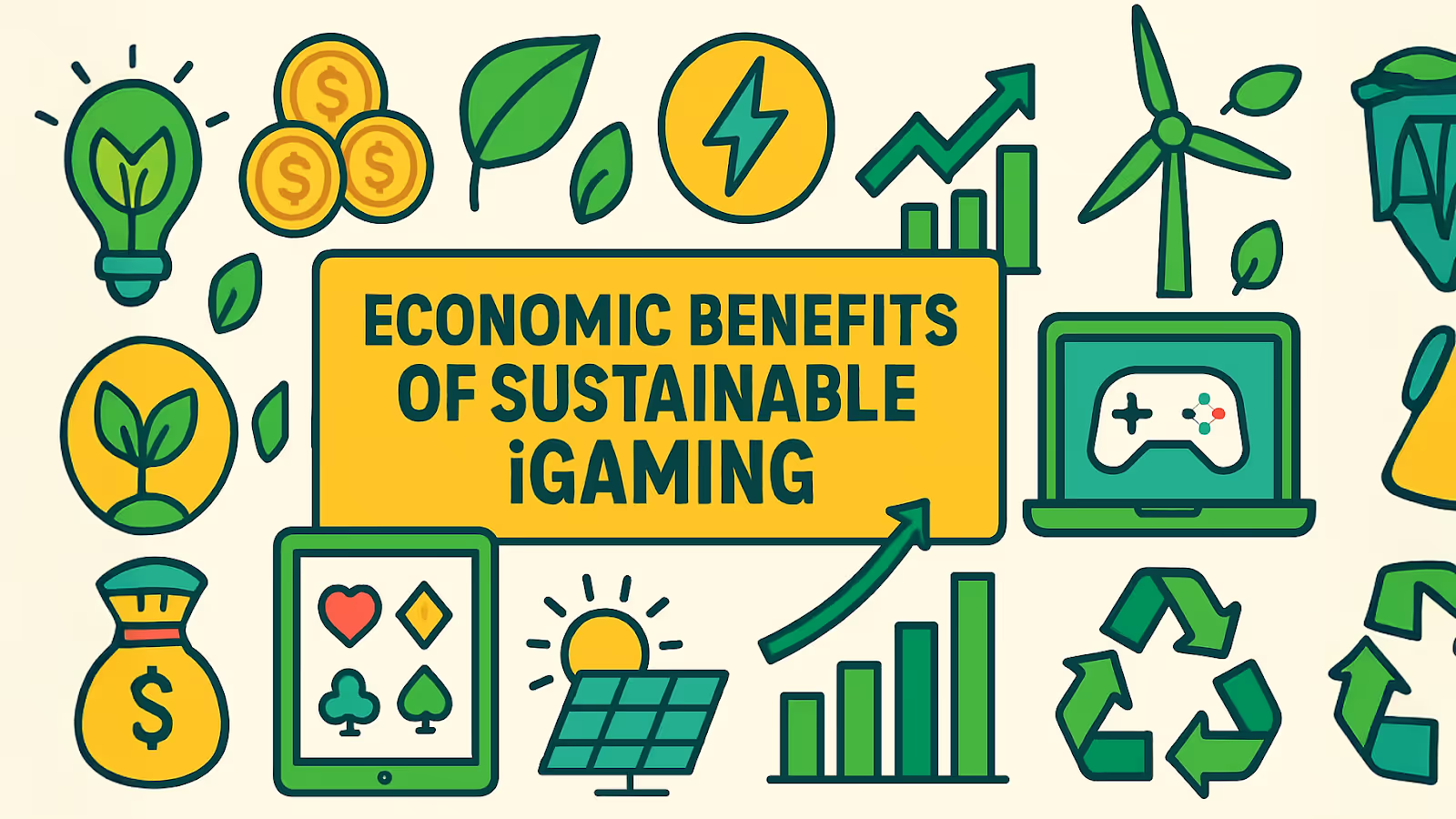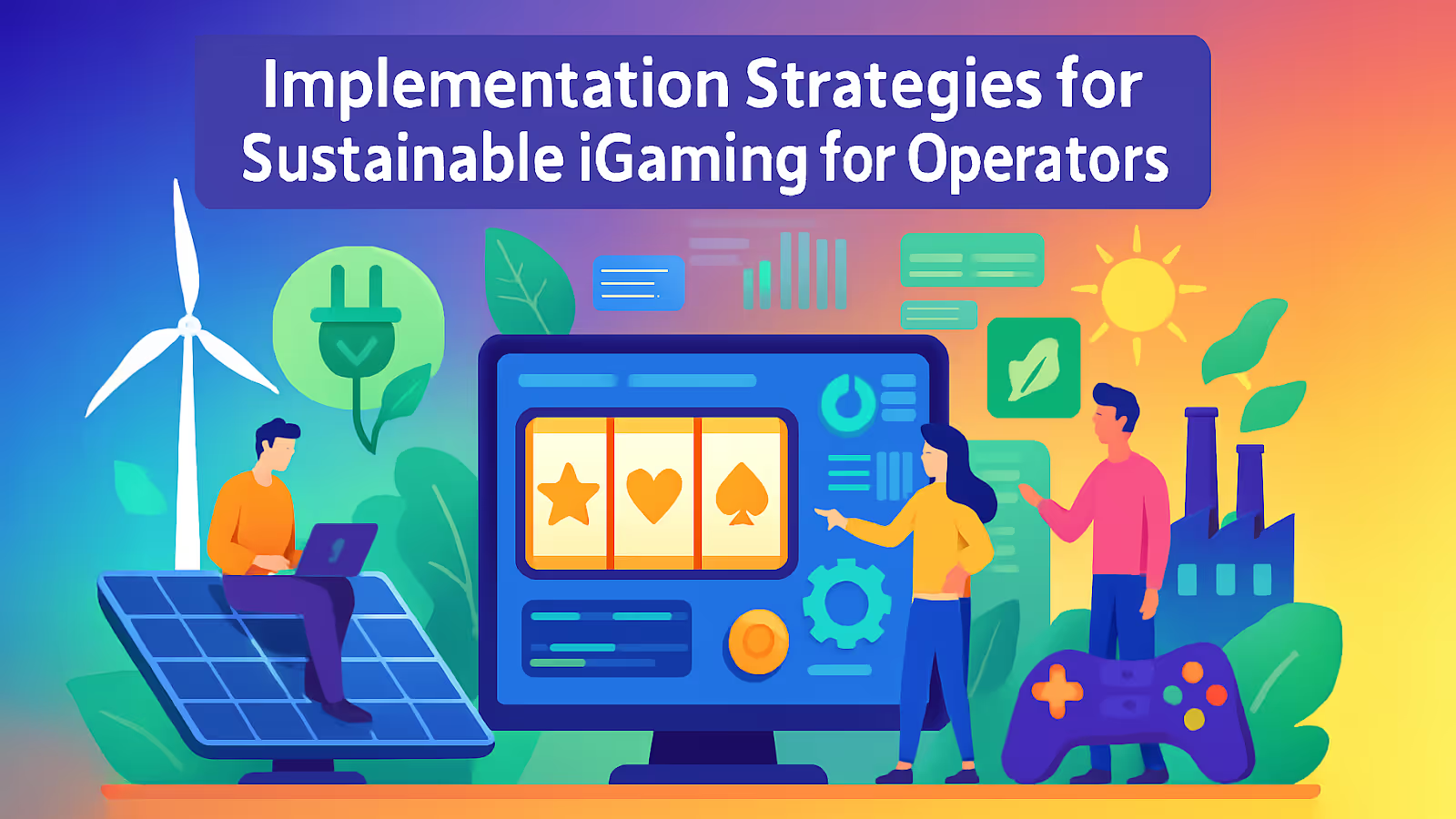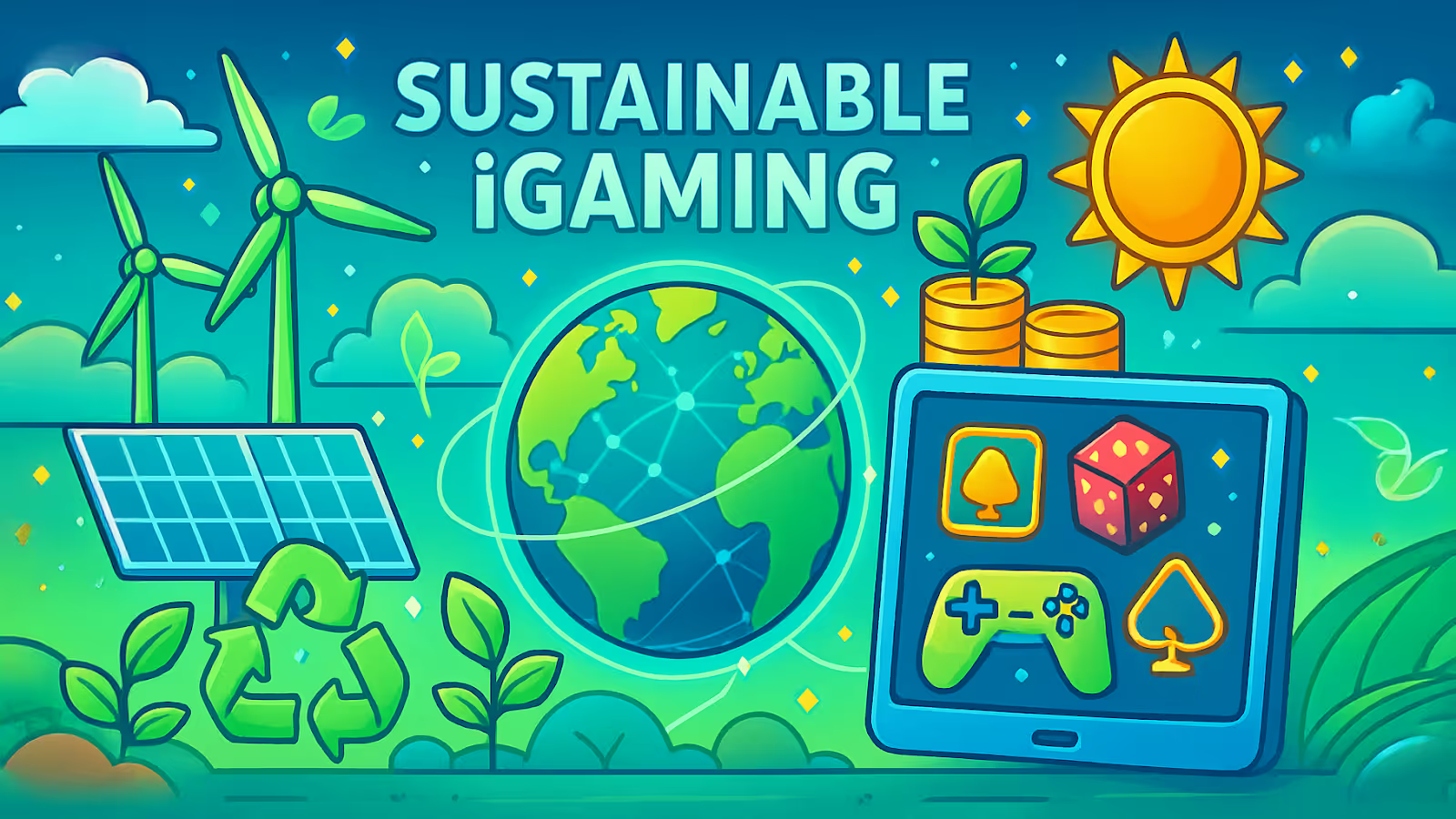Sustainable iGaming Practices: Environmental Responsibility in the Digital Casino Age

The digital revolution has transformed many industries, and the online casino sector is no exception. But as millions of players log in daily for their favorite games, a pressing question emerges: How can the iGaming industry balance entertainment with environmental responsibility? The answer lies in an intelligent approach that combines sustainable technology, smart business practices, and deep customer relationship management.
The Environmental Challenge in Digital Gaming

Energy Consumption Reality
The iGaming industry's environmental footprint is significant but often invisible to players. While online casinos eliminate the need for massive physical buildings with bright neon lights and constant climate control, they rely heavily on data centers that operate around the clock. These digital infrastructures consume substantial electricity to power servers, maintain cooling systems, and provide smooth gameplay.
Research from Lancaster University reveals a sobering reality: if cloud gaming adoption reaches 90% over the next decade, carbon emissions could increase by 30% annually by 2030. This finding underscores the urgent need for sustainable practices as the industry continues its digital transformation.
Data centers supporting online casinos require massive amounts of electricity, consuming energy equivalent to tens of thousands of homes. The carbon intensity of this consumption depends largely on the source of electricity (renewable or fossil fuel-based), which makes energy sourcing decisions critical for environmental impact.
The Carbon Footprint of Digital Entertainment
Every virtual spin of a slot machine or hand of blackjack carries an environmental cost. Unlike their physical counterparts that generate emissions through heating, lighting, and transportation of visitors, online casinos create their environmental impact through:
- Server operations and data processing
- Network infrastructure and data transmission
- Manufacturing and disposal of hardware equipment
- Player device usage and energy consumption
The shift to streaming-based gaming platforms adds another layer of complexity. While eliminating the need for players to travel to physical venues, these platforms increase demand on data centers and network infrastructure, creating a delicate balance between convenience and sustainability.
ESG Framework: The New Industry Standard

Malta Gaming Authority Leadership
The Malta Gaming Authority (MGA) has emerged as a pioneer in ESG integration for the iGaming sector. In November 2024, the MGA awarded its first ESG Code Approval Seals to 14 gaming operators, establishing a framework that covers 19 topics across Environmental, Social, and Governance pillars.
This initiative represents more than regulatory compliance—it's a strategic roadmap for sustainable growth. The Code supports two reporting tiers: foundational standards (Tier 1) and aspirational approaches (Tier 2), allowing operators to progress at their own pace while maintaining accountability.
Companies have responded with ambitious targets, including carbon neutrality commitments and substantial investments in renewable energy sources for their data centers. These efforts demonstrate that environmental responsibility and business success can coexist in the digital age.
Social and Governance Integration
ESG in iGaming extends beyond environmental concerns to encompass social responsibility and corporate governance. Forward-thinking operators are implementing comprehensive strategies that address:
- Responsible gaming initiatives and player protection
- Diversity and inclusion in workplace practices
- Transparent governance and ethical business conduct
- Community engagement and positive social impact
This approach recognizes that sustainability is about more than carbon footprints, as it includes building trust, ensures fair play, and contributes positively to society.
Practical Solutions for Sustainable Operations

Green Data Center Technologies
The transition to sustainable iGaming operations begins with infrastructure optimization. Green data centers represent a fundamental shift in how digital entertainment platforms operate. These facilities focus on energy efficiency through:
Advanced Cooling Systems: Modern data centers implement innovative cooling technologies, including liquid cooling and free air cooling systems that can reduce energy consumption by a large margin. By using ambient temperatures and efficient heat management, operators significantly decrease their Power Usage Effectiveness (PUE) ratios.
Energy-Efficient Hardware: The latest server technologies consume substantially less power while delivering superior performance. Energy-efficient processors, solid-state storage, and optimized memory systems collectively reduce the electricity demand of gaming platforms.
Renewable Energy Integration: Leading operators are partnering with renewable energy providers to power their operations. Solar, wind, and hydroelectric sources offer sustainable alternatives to fossil fuel-based electricity, with some platforms achieving 100% renewable energy usage.
Cloud Computing Optimization
Cloud-based systems offer significant sustainability advantages over traditional on-premise infrastructure. By consolidating resources and optimizing utilization, cloud platforms can reduce energy consumption by 50-100 times per player compared to distributed systems.
Server virtualization plays a crucial role in this optimization, allowing multiple virtual machines to operate on single physical servers. This approach maximizes hardware utilization while minimizing energy waste, creating a more efficient digital ecosystem.
{{cta-banner}}
Carbon Offset Programs
For emissions that cannot be eliminated through efficiency measures, carbon offset programs provide a pathway to neutrality. Leading operators invest in verified projects including:
- Reforestation initiatives that absorb CO2 from the atmosphere
- Renewable energy projects in developing regions
- Landfill gas capture and utilization programs
- Community-based environmental conservation efforts
Betsson AB exemplifies this approach, maintaining climate-neutral operations through strategic investments in verified climate-positive projects. This demonstrates how operators can take immediate action while developing long-term sustainability strategies.
Dynamic Segmentation for Resource Optimization
Advanced player segmentation reduces digital waste by ensuring marketing messages reach only relevant audiences. Dynamic segmentation adapts in real-time to player behavior, preventing over-communication and reducing server loads associated with mass marketing campaigns.
This approach yields multiple sustainability benefits:
- Reduced server processing requirements for campaign delivery
- Lower bandwidth consumption through targeted messaging
- Decreased electronic waste from more efficient resource utilization
- Optimized player journeys that require fewer touchpoints
AI-Driven Efficiency
Artificial intelligence elevates sustainability by optimizing every aspect of customer relationship management. Machine learning algorithms predict player preferences with remarkable accuracy, reducing the trial-and-error approach that wastes computational resources.
Smartico's AI models analyze player data to predict optimal engagement times, preventing unnecessary communications during inactive periods. This intelligent scheduling reduces server loads during peak hours and extends hardware lifecycles through more efficient utilization patterns.
The Role of Technology in Green iGaming

Energy-Efficient Game Design
Game developers increasingly recognize their role in creating sustainable entertainment experiences. Energy-efficient game engines and optimized graphics processing reduce the computational demands of online casino games, directly impacting server energy consumption.
Modern game design principles include:
- Streamlined graphics that maintain visual appeal while reducing processing requirements
- Efficient coding practices that minimize server resource utilization
- Adaptive quality settings that adjust performance based on network conditions
- Compressed data formats that reduce transmission energy costs
Renewable Energy Gaming Platforms
Several innovative platforms have emerged as sustainability leaders in the iGaming space23. These operators demonstrate that environmental responsibility and engaging gameplay can coexist:
GreenPlay Casino has implemented solar-powered data centers, achieving a 40% reduction in carbon emissions while maintaining industry-leading performance standards. Their success proves that renewable energy integration doesn't compromise player experience.
EcoGamer Online uses advanced data compression technology to reduce energy consumption by 30% without affecting game quality. Their approach shows how technical innovation can deliver both environmental and business benefits.
Mobile Optimization for Sustainability
Mobile gaming platforms inherently consume less energy than desktop alternatives. By optimizing games for mobile devices and encouraging mobile play, operators can significantly reduce the overall energy footprint of their player base.
Mobile optimization strategies include:
- Responsive design that adapts to device capabilities
- Efficient data usage to reduce network transmission requirements
- Battery-conscious programming that extends device life
- Offline capabilities that reduce constant server connections
Industry Collaboration and Innovation

Cross-Industry Partnerships
The most effective sustainability initiatives emerge from collaborative efforts between gaming operators, technology providers, and environmental organizations. These partnerships leverage diverse expertise to develop comprehensive solutions that individual companies might not achieve alone.
Google's participation in the Playing for the Planet Alliance demonstrates how major technology companies can support gaming industry sustainability efforts. Through initiatives like the Green Game Jam, the alliance encourages innovative approaches to environmental awareness and action.
Regulatory Framework Evolution
European gaming regulators are increasingly incorporating environmental considerations into licensing requirements. The Article 7 Energy Efficiency Directive affects online casinos operating in EU markets, requiring compliance with energy consumption standards and reporting requirements.
This regulatory evolution creates market incentives for sustainable practices, ensuring that environmental responsibility becomes integral to business operations rather than optional corporate social responsibility initiatives.
Innovation in Sustainable Technologies
Emerging technologies promise even greater sustainability improvements in the coming years. Developments in quantum computing, edge processing, and advanced networking protocols may dramatically reduce the energy requirements of online gaming platforms.
The gaming industry's investment in research and development positions it well to adopt these technologies as they mature, potentially achieving carbon neutrality or even carbon negativity in future operations.
Economic Benefits of Sustainable Practices

Cost Reduction Through Efficiency
Sustainable practices consistently deliver financial benefits alongside environmental improvements. Energy-efficient operations reduce utility costs, while optimized resource utilization extends equipment lifecycles and reduces replacement expenses.
Green data centers typically achieve 20-40% reductions in operating costs through efficient cooling, lighting, and power management systems. These savings create business cases for sustainability investments that don't rely solely on environmental motivations.
Brand Differentiation and Player Preference
Modern consumers increasingly consider environmental factors in their entertainment choices. Players, particularly younger demographics, show preference for platforms that demonstrate genuine environmental responsibility.
This preference translates into competitive advantages for sustainable operators:
- Higher player retention rates among environmentally conscious consumers
- Positive brand associations that support marketing efforts
- Premium positioning that can justify higher service fees
- Employee attraction and retention benefits from purpose-driven operations
Investment and Partnership Opportunities
ESG compliance opens access to sustainable investment funds and environmentally focused partnerships. Financial institutions increasingly screen investments based on environmental criteria, making sustainability essential for accessing capital markets.
Green bonds, sustainability-linked loans, and ESG investment funds provide financing advantages for operators who demonstrate genuine environmental commitments. These financial instruments often offer favorable terms that offset sustainability implementation costs.
Implementation Strategies for Operators

Assessment and Planning
Successful sustainability implementation begins with comprehensive environmental impact assessment. Operators must understand their current carbon footprint, energy consumption patterns, and resource utilization before developing improvement strategies.
Key assessment areas include:
- Data center energy consumption and PUE ratios
- Network infrastructure efficiency and optimization opportunities
- Software and game design impact on resource requirements
- Player behavior patterns and engagement efficiency
- Supply chain environmental impacts and improvement potential
Phased Implementation Approach
Sustainability transformation works best through systematic, phased implementation rather than sudden comprehensive changes. This approach allows operators to learn from early initiatives while building organizational capabilities for more ambitious projects.
Phase 1: Foundation Building
- Energy efficiency audits and quick wins
- Renewable energy procurement for data centers
- Basic CRM optimization for reduced resource waste
- Staff training and awareness programs
Phase 2: Advanced Integration
- AI-driven personalization and efficiency optimization
- Carbon offset program implementation
- Supply chain sustainability requirements
- Green game development guidelines
Phase 3: Innovation Leadership
- Advanced technology adoption and testing
- Industry collaboration and knowledge sharing
- Regulatory leadership and standard setting
- Community engagement and environmental education
Measurement and Reporting
Transparent measurement and reporting systems ensure accountability and drive continuous improvement. Operators should implement comprehensive monitoring systems that track key environmental metrics and progress against established targets.
Essential metrics include:
- Carbon footprint and emission reduction progress
- Energy consumption per player and efficiency improvements
- Renewable energy percentage and procurement targets
- Waste reduction and circular economy initiatives
- Water usage and conservation measures where applicable
Future Trends and Opportunities

Technological Advancement Integration
The gaming industry stands at the forefront of several technological developments that promise even greater sustainability improvements. Artificial intelligence will continue optimizing resource allocation, while advances in hardware efficiency reduce baseline energy requirements.
Edge computing technologies may distribute processing closer to players, reducing network transmission requirements and improving performance while lowering overall energy consumption. These developments suggest that sustainability and performance optimization will increasingly align.
Regulatory Evolution and Market Dynamics
Environmental regulations will likely become more stringent and comprehensive across gaming markets. Operators who proactively adopt sustainable practices position themselves advantageously for future regulatory requirements while building operational capabilities that competitors may lack.
The European Union's Corporate Sustainability Reporting Directive (CSRD) will eventually affect many gaming operators, making ESG reporting mandatory rather than voluntary. Early adoption of smart sustainability practices prepares operators for these requirements while capturing first-mover advantages.
Player Engagement and Environmental Education
Gaming platforms possess unique capabilities for environmental education and behavior change. Through gamification of environmental actions and integration of sustainability themes into gameplay, operators can contribute to broader environmental awareness while building player loyalty.
This approach creates shared value – players gain enhanced engagement and environmental awareness while operators build stronger relationships and positive brand associations. The potential for gaming to drive real-world environmental action remains largely untapped.
Sustainable CRM & Gamification Practices: The Smartico Approach

Modern CRM systems contribute to sustainability through improved operational efficiency and reduced resource waste. By using advanced analytics and artificial intelligence, platforms like Smartico create highly personalized player experiences that minimize unnecessary communications and optimize marketing spend.
Personalized loyalty programs significantly reduce the environmental impact of customer engagement. Instead of broadcasting generic messages to entire player bases, intelligent CRM systems deliver targeted communications that achieve higher conversion rates while consuming fewer resources.
Smartico.ai stands as the first and leading unified Gamification / CRM Automation software in history. Founded in 2019 by four passionate entrepreneurs, Smartico revolutionized player engagement by combining real-time automation, gamification, and actionable insights in a single platform.
Innovation Through Integration
Smartico's unified approach addresses the sustainability challenge through remarkable efficiency gains. By combining CRM automation and gamification in one platform, operators eliminate the resource waste associated with multiple system integrations while achieving superior player engagement results.
The platform's AI-driven personalization massively reduces unnecessary communications, significantly lowering server loads and energy consumption. Real-time behavioral tracking enables precise reward delivery, preventing the resource waste of poorly targeted campaigns that characterize less sophisticated systems.
Future-Ready Sustainability Features
As the first unified platform in the industry, Smartico continues setting standards for sustainable innovation. The platform's multi-brand capabilities enable operators to manage numerous properties through a single instance, dramatically reducing infrastructure requirements compared to traditional approaches.
Smartico's commitment to continuous improvement ensures that sustainability enhancements remain integral to platform development. Monthly feature releases consistently incorporate efficiency improvements that benefit both operators and the environment, demonstrating that technological advancement and environmental responsibility can advance together.
Through partnerships with hundreds of operators worldwide, Smartico proves that sophisticated player engagement and environmental sustainability are not competing priorities, but complementary aspects of responsible business operations in the digital age.
Book your free, in-depth demo today to find out how Smartico can significantly boost your iGaming revenue, the sustainable way.
{{cta-banner}}
Conclusion: A Sustainable Path Forward
The iGaming industry stands at a crucial juncture where environmental responsibility and business success increasingly align. Through comprehensive ESG integration, innovative technology adoption, and intelligent CRM practices, operators can build sustainable operations that benefit players, communities, and the planet.
Success requires commitment across multiple dimensions, including energy-efficient infrastructure, renewable energy adoption, AI-driven personalization, and circular economy principles. The operators who embrace this intelligent approach will emerge as industry leaders in an increasingly environmentally conscious market.
Platforms like Smartico.ai demonstrate that sustainability and sophistication can coexist, offering operators the tools needed to reduce environmental impact while enhancing player engagement. As regulatory requirements evolve and consumer preferences shift toward environmentally responsible entertainment options, the companies investing in sustainable practices today will define the industry's future tomorrow.
The transition to sustainable gaming practices represents more than environmental compliance. It is an opportunity to build more efficient, resilient, and socially responsible businesses that create lasting value for all stakeholders in the digital entertainment ecosystem.
Frequently Asked Questions
Q: How much energy do online casinos actually consume compared to physical casinos?
A: Online casinos typically consume 50-100 times less energy per player than physical venues. While land-based casinos require massive buildings, constant lighting, and climate control systems, digital platforms rely primarily on data centers and network infrastructure, resulting in significantly lower per-player energy consumption.
Q: What specific technologies help reduce the carbon footprint of online gaming platforms?
A: Key technologies include energy-efficient servers with optimized processors, advanced cooling systems like liquid cooling and free air cooling, renewable energy integration for data centers, cloud computing optimization that maximizes resource utilization, and AI-driven personalization that reduces unnecessary communications and server loads.
Q: How do carbon offset programs work in the iGaming industry?
A: Gaming operators invest in verified environmental projects to compensate for unavoidable emissions. These include reforestation initiatives that absorb CO2, renewable energy projects in developing regions, landfill gas capture programs, and community-based conservation efforts. Companies like Betsson maintain climate-neutral operations through strategic investments in verified climate-positive projects.
Q: What role does artificial intelligence play in making online casinos more sustainable?
A: AI optimizes resource utilization through predictive analytics that reduce unnecessary server processing. Machine learning algorithms predict player preferences and optimal engagement timing, preventing wasted communications and extending hardware lifecycles. Advanced segmentation ensures marketing messages reach only relevant audiences, reducing digital waste and energy consumption.
Q: How do ESG regulations affect online casino operators?
A: The Malta Gaming Authority has implemented the first ESG Code for iGaming, requiring operators to report on 19 environmental, social, and governance topics. The EU's Corporate Sustainability Reporting Directive (CSRD) will mandate ESG reporting for many operators. These regulations create accountability frameworks while providing competitive advantages for early adopters who demonstrate genuine sustainability commitments.
Q: What are the business benefits of implementing sustainable gaming practices?
A: Sustainable practices typically reduce operating costs by 20-40% through energy efficiency, attract environmentally conscious players who show higher retention rates, provide access to green financing options and ESG investment funds, and create positive brand differentiation in competitive markets. Companies also benefit from improved employee attraction and retention through purpose-driven operations.
Did you find this article helpful? If so, consider sharing it with other industry professionals like yourself.
Ready to use Smartico?
Join hundreds of businesses worldwide engaging players with Smartico.










